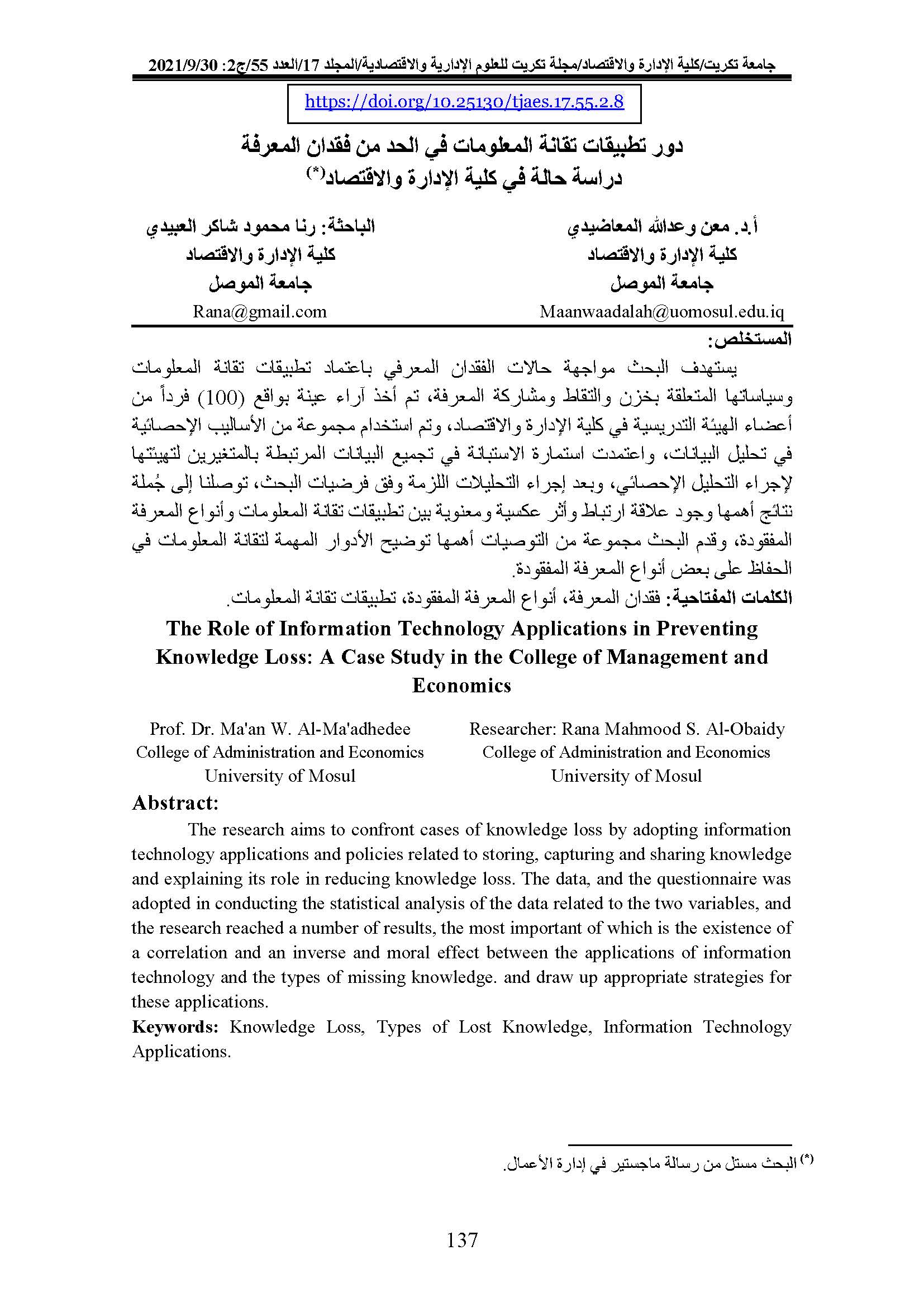The Role of Information Technology Applications in Preventing Knowledge Loss: A Case Study in the College of Management and Economics
Main Article Content
Abstract
The research aims to confront cases of knowledge loss by adopting information technology applications and policies related to storing, capturing and sharing knowledge and explaining its role in reducing knowledge loss. The data, and the questionnaire was adopted in conducting the statistical analysis of the data related to the two variables, and the research reached a number of results, the most important of which is the existence of a correlation and an inverse and moral effect between the applications of information technology and the types of missing knowledge. and draw up appropriate strategies for these applications.
Downloads
Article Details
References
أولاً. المصادر العربية
أ. الرسائل والاطاريح الجامعية:
الطائي، أيمن جاسم، 2020، أنماط الاتصالات الاستراتيجية وانعكاسها في بناء القدرات الدينامية: الدور الوسيط لخصائص التكامل المعرفي دارسة ميدانية في جامعة الموصل، أطروحة دكتوراه (غير منشورة)، كلية الإدارة والاقتصاد، جامعة الموصل.
ثانياً. المصادر الأجنبية:
Aggestam, L., Söderström, E., & Persson, A., 2010, Seven types of knowledge loss in the knowledge capture process, The 18thEuropean Conference on Information Systems Proceedings, Pretoria, June, PP (7-9).
Aiman-Smith, L., Bergey, P., Cantwell, A., & Doran, M., 2006, the coming knowledge and capability shortage, Research Technology Management, Vol (49), No (4), PP15-23.
Alavi, M. & Leidner, D.E., 2001, Review: knowledge management and knowledge management systems: conceptual foundations and research issues, MIS Quarterly, Vol (25), No (1), PP (107-136).
Andreev, V. N., Sigankov, A. A., Chervenkova, S. G., Abarinov, S. N., & Shatskaya, I. V., 2020, Knowledge Mapping as a Task of Personnel Training of Digital Economy Companies,Published by Atlantis Press SARL, Vol (119), PP (83-87).
Deholan, P., & Phillips, N., 2004, Remembrance of things past? The dynamics of organizational forgetting, Management Science, Vol (50) No (11), PP (1603-1613).
Delong, 2005, Diagnosing the Costs of Lost Knowledge on Organizational Performance, Working Knowledge Research Center, PP (1-15).
Droege, S.B., & Hoobler, J.M., 2003, Employee turnover and tacit knowledge diffusion: a network perspective, Journal of Managerial Issues, Vol (15), No (1), PP (50-61).
Durst, S., & Zieba, M., 2018, mapping knowledge risks: towards a better understanding of knowledge management, Knowledge Management Research and Practice, PP (1-13).
Martins, E.C.,& Martins, N., 2011, The role of organisational factors in combating tacit knowledge loss in Organizations, Southern African Business Review, Vol. (15), No (1), PP (49-70).E-mail: [email protected]
Martins, E.C., & Meyer, H. W., 2012, Organizational and behavioral factors that influence knowledge retention, Journal of Knowledge Management, Vol. (16), No (1), PP (77-96).
Mcinerney, C., 2002, Knowledge management and the dynamic nature of knowledge, Journal of the American Society for Information Science and Technology, Vol. (53), No (12), PP (1009-1018).
Petersen, S. A., Oliveira, M., Hestetun, K., & Sørensen, A. Ø., 2019, ALF-a Framework for Evaluating Accelerated Learning in IndustrX. International Journal of Serious Games, Vol. (6), No (3), PP. (81-99).
Rambe, P., & Agnes, M., 2017, Technology-Enhanced Knowledge Management Framework for Retaining Research Knowledge among University Academics, Journal of Economics and Behavioral Studies, (ISSN: 2220-6140) Vol. (9), No (1), PP.189-206.
Raudeliuniene, J., Albats, E., & Kordab, M., 2020, Impact of information technologies and social networks on knowledge management processes in Middle Eastern audit and consulting companies, Journal of Knowledge Management, PP. (1-28).
Ravinchandran, T. T., & Lertwongsatien, C., 2005, Effect of information systems resources and capabilities on firm performance: a resource-based perspective, Journal of Management Information Systems, Vol (21), No (4), PP (237-276).
Reagans, R., Argote, L., & Brooks, B., 2005, Individual experience and experience working together: predicting learning rates from knowing who knows what and knowing how to work together, Management Science, Vol. (51), No (6), PP (869-881).
Rotman, D., 2013, How technology is destroying jobs. Technology Review, Vol. (16), No (4), PP (28-35).
Sumbal M. S., Tsui, E., Cheong, R., & See To, E. W. K., 2018, Critical areas of knowledge loss when employees leave in the oil and gas Industry, Journal of Knowledge Management, Vol. (22), No. (7), PP (1573-1590).
Sumbal, S. M., Tsui, E., Durst, S., Shujahat, M., Irfan, I., & Ali, S. M., 2019, A Framework to Retain the Knowledge of Departing Knowledge Workers in the Manufacturing Industry, Journal of Information and Knowledge Management Systems, PP. (1-18). ©Emerald Publishing Limited.
Wethyavivorn, P., & Teerajetgul, W., 2020, Tacit Knowledge Capture in Thai Design and Consulting Firms, Journal of Construction in Developing Countries, Vol. (25), No. (1), PP (45-62).
Winkelen, C., & McDermott, R., 2008, Facilitating the Handover of Knowledge, Journal of Knowledge Management Review, Vol. (11), No. (2), PP. (24-27).
Wong K. Y., & Aspinwall E., 2005, An Empirical Study of The Important Factors For Knowledge Management Adoption in the Smesector, Journal of Knowledge Management, Vol. (9), No. (3), PP. (64-82).
DeLong, W., 2004, Lost Knowledge: Confronting the Threat of an Aging Workforce, Oxford University Press.


